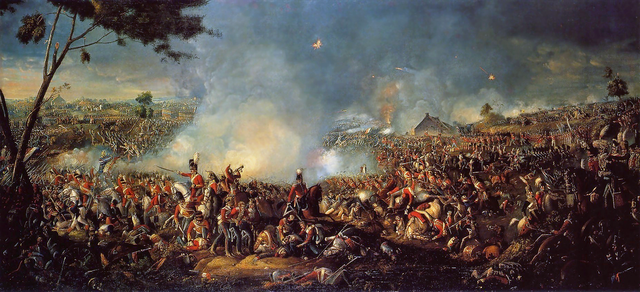The ‘popularity’ of the Napoleonic wars never ceases to bemuse and amaze me. I was afforded the great privilege of attending the 200th anniversary of the Battle of Waterloo and later the 75th Anniversary of Operation Market Garden, the failed World War 2 effort to establish a bridgehead over the Rhine.
The reasons for attending those momentous occasions were. in the first instance, to have a weekend away on the piss with my mates, peacocking around in scarlet and being photographed. But it also was to try to commemorate what was in both cases a desperate human tragedy. On the one hand it was clear that, in order to peacock around Waterloo and to cycle from Eindhoven to Arnhem, one first had to be free, and this became rapidly clear to me. Free. It is a cliché to say that freedom isn’t free, but let’s just dwell on that for a time.
The Battle of Waterloo, without a doubt was a decisive happening. Barring one or two (relatively minor compared to the Napoleonic Wars) confrontations it led to peace in Europe for a hundred years. It is interesting to note that in August 1914 the first blow (literally) was struck by the BEF when Captain Charles Hornby of the 4th Royal Irish Dragoons, killed the first German at Mons, a mere 25 miles southwest of Waterloo, with his sabre.
If Napoleon hadn’t been defeated, and by God it was close, how long would he have carried on waging war in Europe? 5? 10 years? More? If Market-Garden had been a success, how much shorter would WW2 have been and how many lives not ended or destroyed?
It is abundantly our duty to enjoy the freedoms that are bestowed on us by the efforts of our ancestors in these conflicts. I wonder, if one could resurrect any of the lads killed at Waterloo or Arnhem and ask them what would be the best way to honour their sacrifice. Maybe it would be to do what they were deprived of doing, enjoying freedom to the full, but importantly to keep their sacrifice in mind.

On walking through the beer tents, the grandstands for the major re-enactment and the cafes, I could not help thinking what those lads would make of it. Waterloo 200 had the feel of a Music festival, not so much Arnhem. However, I was genuinely appalled at the disco tent on the Utrechtseweg in Oosterbeek, drunk people spilling out with plastic pints of beer.
Or perhaps if Wellington himself had chance to walk through it, what would the Iron Duke say? I’m not convinced he would compliment us. Having said that, the machinations of finances and the modern world require perhaps the commercial input in order for the event even to happen, and that it is a good thing that it is commemorated at all and remembered for the purposes of educating the young on why they are free and attempting to make them appreciate it.
On the other hand, my experience (and it is a privilege) of WW2 veterans, tells me that it is not necessarily the way they would want us to commemorate their efforts. Everyone, to a man or woman said the same thing – that all they wanted to do was forget it the instant it was over. The other common sentiment was that it was a pain in the arse. Careers, ambitions, studies, love, and family life had to be put on hold to get this ‘thing’ done, and none of them even mentioned it until the 1970s.
The study of history I think is essential, but I have come across people of all ages contending that there is no point in studying it. On the face of it there isn’t, but considering the attitude of WW2 veterans above there is an evident cycle subsequent to the communal experience of the cataclysm of war. Waterloo brought an end to war in Europe, and the generation who fought in it made sure that peace was maintained in their lifetime. The next generation were affected by their parents PTSD and their iron control of anti-war politics, such that they had the same ideal. However, when the veterans start to die off and the experience is second-hand, then third-hand, the vehement antiwar spirit wanes, and the spectre of war starts to tentatively emerge from it’s grave. The jingoism of the Volunteers of the BEF in 1914 was naïve, as one WW1 veteran I spoke to, admitted to me at a bus stop in 1986, that he volunteered because it was a cause worth fighting for, but he wished he hadn’t bothered and that he was one of the lucky ones.
The hundred year, four generation rule is nearly upon us after WW2, and tanks roll across Ukraine. The study of history, and particularly appeasement of Hitler before WW2, should be studied and taught. Thank the Lord and Zelensky that the Ukrainians have bravely sacrificed their lives, limbs and mental health to hold the Putin orcs and another world war at bay.
